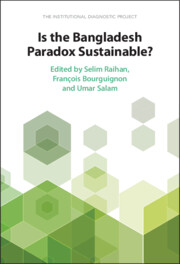Is the Bangladesh Paradox Sustainable?
Bangladesh is widely seen as a ‘paradox’. Over the last quarter of a century, it has maintained economic growth and has outperformed many countries on social indicators while scoring very low on the quality of governance. Moreover, its economic progress does not seem to indicate significant improvement in comparative institutional indicators. Is the Bangladesh Paradox Sustainable? thus examines whether such a paradoxical combination can be sustained in the long run if growth continues with no improvement in the quality of institutions. It argues that although Bangladesh has become the second largest world exporter in the garments, export diversification is needed, both within and outside the garment sector, if it is to maintain its development pace. Based on a thorough account of the country’s economic, social, and political development, this companion volume analyses Bangladesh’s critical institutional issues in relation with development-sensitive areas such as the garment sector, banking, taxation, land management, the judiciary, and education. This title is also available as Open Access on Cambridge Core.
Selim Raihan is Professor at the Department of Economics, University of Dhaka, Bangladesh, and the Executive Director of the South Asian Network on Economic Modeling (SANEM). He is Honorary Senior Research Fellow at the University of Manchester, UK, and Member of the Board of Directors, Global Development Network. His publications include more than 100 articles and 10 books.
François Bourguignon is Emeritus Professor of Economics, the Paris School of Economics and EHESS, Paris. He is Former Chief Economist and Senior Vice President of the World Bank and the Co-founder of the European Development Network. His awards include Dan David Prize and CNRS silver medal.
Umar Salam is Principal Economist, Oxford Policy Management, and a Scientific Committee Member of the Economic Development and Institutions (EDI) Programme.

